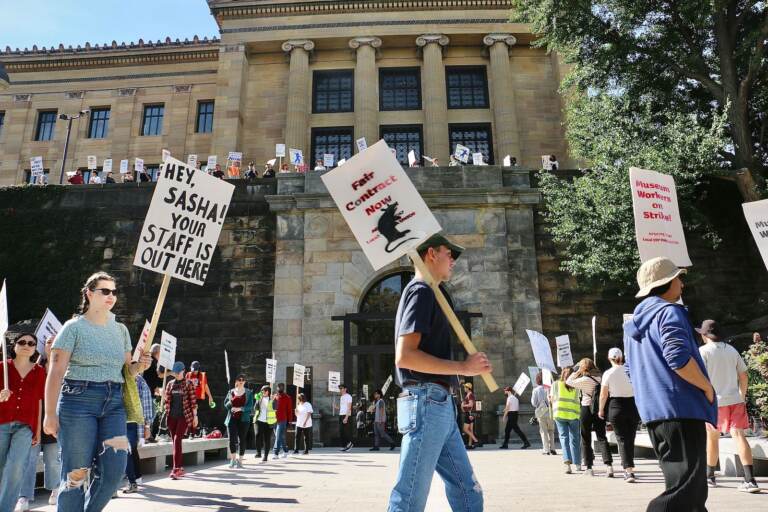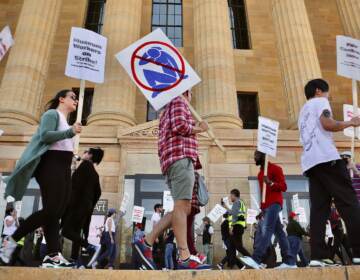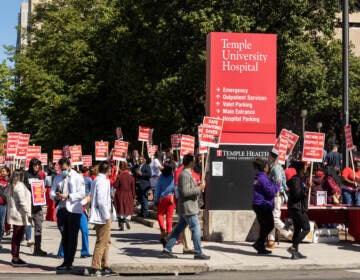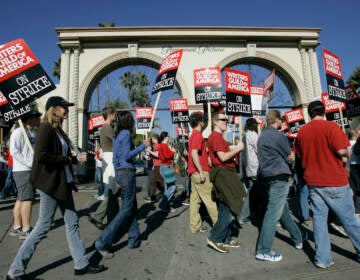Philly art museum union to end strike, calling tentative deal a ‘game-changer’
After picketing outside the museum for 19 days, workers at the Philadelphia Museum of Art will vote to ratify a new contract Sunday.

File photo: Union members picket outside the North entrance to the Philadelphia Museum of Art while the museum hosts a press preview of an upcoming Matisse exhibit. (Emma Lee/WHYY)
The strike at the Philadelphia Museum of Art is over.
After picketing outside the museum for 19 days, the workers of the Philadelphia Museum of Art will put down their signs and bullhorns, and vote for ratification on Sunday.
The strike has been called off, and workers expect to return to the job on Monday.
Union president Adam Rizzo said the museum “caved,” and the union got everything it wanted in terms of raises and health benefits.
“This contract is a game-changer for current PMA workers, for the future of the museum, and for workers throughout the entire cultural sector,” Rizzo said. “Now, the PMA is an even greater symbol of our city.”
Lee Saunders, the president of the American Federation of State, County and Municipal Employees (AFSCME), of which the museum unit is a member, praised the PMA workers for sticking out the strike.
“This is why cultural workers at museums, libraries and zoos across the country have started a wave of worker organizing that’s taking hold of the industry,” Saunder said in a statement.
Museum board chair Leslie Ann Miller credited City Hall for helping bring the stalled negotiations to a close.
“Deputy mayor for labor relations Rich Lazer had been a counselor to both sides for some time, attempting to help push us the way forward,” Miller said.
“We believe that a right-sizing has taken place in terms of compensation and other benefits,” she said. “This is a contract that will last for three years. We feel very positively about the strength of the foundation.”
After two years of negotiating, the union called a strike on September 26 after being unable to reach a deal on a contract with the museum. That was the same day that Sasha Suda arrived at the museum to begin her role as its director.
Suda did not engage in the negotiations with the union, which was a cause for complaint with some of the strikers.
“It took some time for me to get my bearings and try to figure out where I am and what the challenge in front of me really was, and to listen as closely and as attentively as I could,” Suda said. “Not actively involved at the table. There’s a team that does that. That’s pretty much status quo. But the end result is that of collaboration and of me being invited to be part of that conversation moving forward.”
Suda admitted that walking into a strike on the first two weeks of the job was “not very auspicious,” but in hindsight was a fortunate time to witness at the beginning of her tenure as leader.
“I wouldn’t have gotten a real sense for the energy and what was at stake for everybody involved. I think it’s an enormous privilege to have come in at the very end of this moment,” she said.
The union had been asking for a 14% salary increase in response to wage stagnation and inflation, a minimum wage of $16.75; making raises retroactive to July 1, when non-union staff received raises; and decreasing the cost of health insurance.
The museum had countered, offering to increase pay by 11% by 2024, four weeks of paid parental leave, accelerated health benefits eligibility for new employees, and job security protections.
The agreement comes just a day before the union planned to stage a demonstration on Saturday while museum donors and trustees were there for a gala celebration for the opening of a long-anticipated exhibition about Henri Matisse.
“Matisse in the 1930s” features about 140 works by the beloved French modernist tracking a transformative period in his life and work, in part spurred by a key mural commission in Philadelphia at the Barnes Foundation. The PMA will be the only U.S. museum to host the exhibition.
WHYY is your source for fact-based, in-depth journalism and information. As a nonprofit organization, we rely on financial support from readers like you. Please give today.







